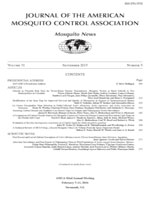The Aedes mosquito vectors of dengue virus (DENV) and chikungunya virus (CHIKV) are attracted to specific host cues that are not generated by traditional light traps. For this reason multiple companies have designed traps to specifically target those species. Recently the standard trap for DENV and CHIKV vectors, the BG-Sentinel (BGS) trap, has been remodeled to be more durable and better suited for use in harsh field conditions, common during military operations, and relabeled the BG-Sentinel 2 (BGS2). This new trap was evaluated against the standard Centers for Disease Control and Prevention (CDC) light trap, Zumba Trap, and BG-Mosquitito Trap to determine relative effectiveness in collecting adult Aedes aegypti and Ae. albopictus. Evaluations were conducted under semifield and field conditions in suburban areas in northeastern Florida from May to August 2014. The BGS2 trap collected more DENV and CHIKV vectors than the standard CDC light trap, Zumba Trap, and BG-Mosquitito Trap, but attracted fewer species, while the BG-Mosquitito Trap attracted the greatest number of mosquito species.
How to translate text using browser tools
1 September 2015
Assessing Carbon Dioxide and Synthetic Lure-Baited Traps for Dengue and Chikungunya Vector Surveillance
James F. Harwood,
Hanayo Arimoto,
Peter Nunn,
Alec G. Richardson,
Peter J. Obenauer
ACCESS THE FULL ARTICLE
It is not available for individual sale.
This article is only available to subscribers.
It is not available for individual sale.
It is not available for individual sale.
Aedes aegypti
Aedes albopictus
BG-Mosquitito Trap
BG-Sentinel 2
Centers for Disease Control and Prevention light trap
Zumba Trap





